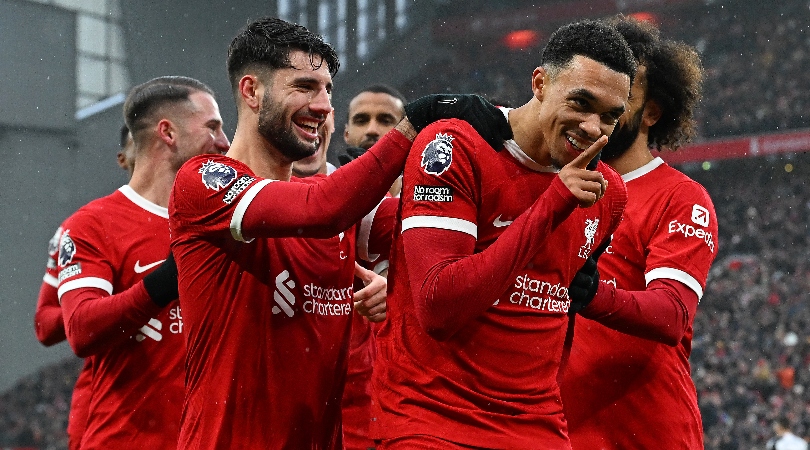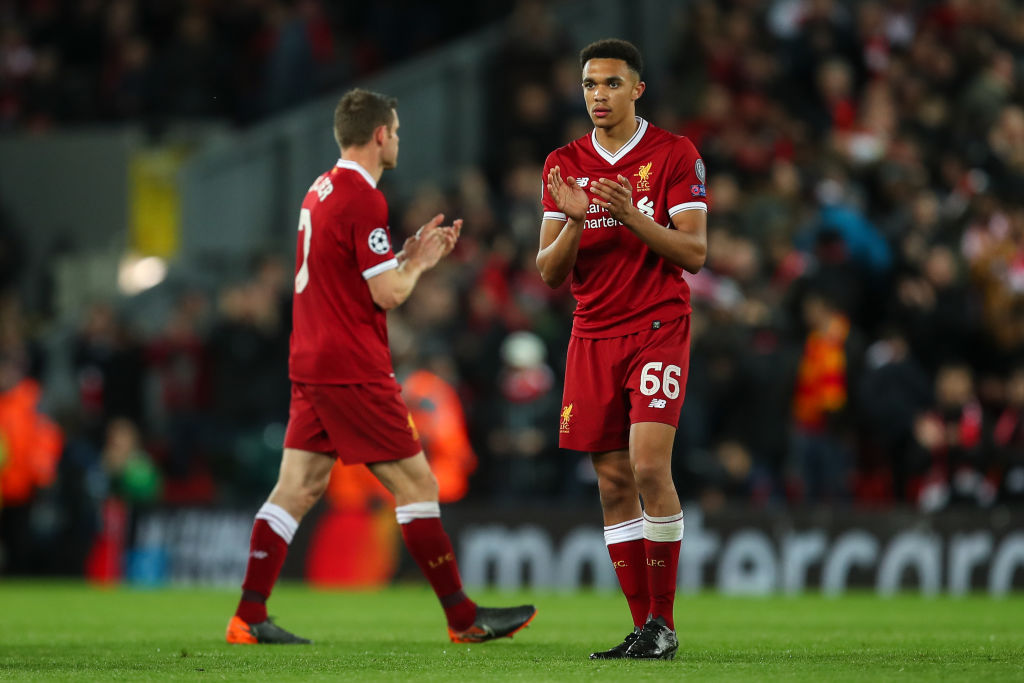
April 2018 and I’m sat opposite Liverpool star Trent Alexander-Arnold, in his family kitchen.
Trent was 19 years old and just two days earlier had starred in Liverpool’s emphatic 5-2 victory over Roma in the Champions League semi-final first leg at Anfield.
There was Man of the Match champagne on the kitchen counter and a few other people in the Alexander-Arnold household that day, as well as mum, dad and younger brother Marcel. This was a kind of media open house arranged via his boot sponsor at the time, and I’d been invited for a 20-minute audience with English football’s bright new star.
Among many hot topics, such as what his favourite chocolate was (“I’d love to get a Freddo after school”) we talked tactics, and whether or not it was true that his positional heart lay in midfield rather than right back.
It was widely known among Liverpool fans at the time, but lesser known outside those circles, that Trent was a mini Stevie G in his youth. A born midfielder who naturally idolised the former Liverpool captain as a young lad from Merseyside would do.
But around the time he turned professional with Liverpool, their first team was heavily stocked in the middle of the pitch: James Milner, Philippe Coutinho, Jordan Henderson, Adam Lallana, Lucas Leiva, Emre Can, Joe Allen, plus about a dozen youngsters were ahead of Trent in a lengthy pecking order.

During this time some brilliant, long-term thinking by Liverpool’s academy staff took place. Recognising they had a massive talent on their hands, they potentially saved Trent’s career at the club by permanently switching his priority position from midfield to right back.
Though Pep Lijnders did deploy Trent in midfield when he arrived to coach at the academy in 2014/15, telling the Coaches Voice last year: “I saw a player who could play the final pass from almost everywhere, and as the six you have the chance to do that. Ruben Neves had been my six in all the youth teams at Porto, and from the middle Trent has that ability to reach even more positions with his passing.”
I asked Trent about the permanent transition from midfield to right back he made soon after 2014/15. He was typically laid back about it: “We looked at it and decided to turn me into a right back. Changing positions isn't easy, you've got to work hard and study the game from a different point of view and you've got to learn a new position. With the help of the staff at the academy they helped me do that.”
A Premier League, FA Cup, EFL Cup and Champions League title later, Trent is back in midfield. Potentially for good.
The Trent narrative that he can’t defend can be confined to the bin. FourFourTwo’s Adam Clery put it best in a recent video titled ‘Why Trent Alexander-Arnold Deserves WAY More Respect’: defending is no longer Trent’s job, really.
Was it even his main job when he operated as a traditional right-back? Debatable.
VIDEO: Why Trent Alexander-Arnold Deserves WAY More Respect
Liverpool, in eight years under Jurgen Klopp, do more attacking than they do defending, and Trent has been a huge part of their offensive output as a defacto attacking wing-back.
But his average position this season has basically been on the right side of central midfield. Liverpool clearly get more out of him in this area of the pitch compared to him hugging the right touchline. Trent might be starting games in the right-back position, but his real estate is very much midfield.
Hybrid Trent 1.0 tended to occupy high positions on the wing, as well perform defensive duties at right back when out of possession. But Trent 2.0 has found his home in the middle of the pitch.
Asked recently about his evolution, he matter-of-factly said: “I think the way I see it and the way I am told and explained to play it [at Liverpool], it is almost when we have the ball I am a midfielder and when we don’t have the ball I am a right-back.”
This is the Philip Lahm, Joshua Kimmich blueprint and it’s starting to have a big impact on Liverpool. Trent in midfield equals chaos for the opposition and controlled chaos for Klopp. Trent is a generational talent with the ball at his feet.
Two seasons ago he was the team’s primary target for progressive passes, now he is the main provider of progressive passes. “Has he passed his progressive passes test? He GIVES the test!” He made 26 passes into the final third on Sunday vs Fulham, more than double the next player.

Going man-for-man against Liverpool’s midfield is pretty futile (Newcastle failed at home and with a man advantage in August) with Trent quickly and quietly transitioning into the middle like a James Bond antagonist whose weapon of choice is an expansive diag.
It feels like Trent is starting to run this team. Setting the tempo, conducting the play. Trent is now quarterback rather than wide receiver. It’s a trade off that’s paying off.
But, there’s a but. "We have to make decisions what's best for the team” Jurgen Klopp told press this week. If Trent continues to score goals, will Klopp be tempted to convert him into a fully fledged No.8, or a deep No.8 perhaps?
It’s an interesting thought ahead of Euro 2024: Rice 6, Trent 8, Bellingham 10. Could be too spicy for Gareth. But admit it England fans, you’d love to see that.
Trent isn’t Liverpool’s answer to Rodri. He’s a ‘deep 8’. But No.8 is an in-demand shirt at Anfield. Dominik Szoboszlai, Alexis Mac Allister, Ryan Gravenberch and Curtis Jones all have designs on that position. So a full conversion from right back to midfield for Trent would mean bench time for some expensive players.
Furthermore, Liverpool’s current system is working, but there’s a sell-by date on all tactics. If Liverpool sign a ‘proper’ right back in 2024, freeing Trent completely from defensive duties, it could be time to reach for the popcorn.
More Liverpool stories
Liverpool set for talks with 'the next Virgil van Dijk': report
Liverpool 4-3 Fulham: Trent Alexander-Arnold channels Steven Gerrard on afternoon of emotional football at Anfield
Liverpool to continue midfield rebuild with 'dribble-happy' star - who will give the Reds another dimension: report







